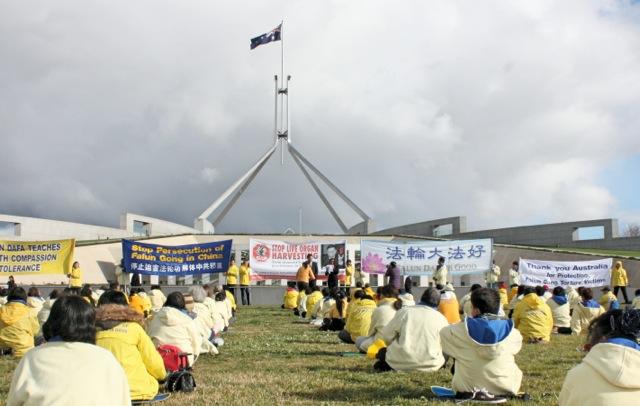[xtypo_dropcap]L[/xtypo_dropcap]ast week, Hong Kong approved the road map for setting a minimal wage requirement, but opponents say the fallout from the bill will have a dire effect on one of the world’s most robust economies.
After a marathon 41-hour debate in the Legislative Council (LegCo), lawmakers have agreed to appoint a special task group, who will be responsible for setting the minimal wage policies in the Hong Kong’s Special Administrative Region (HKSAR).
The group is expected to announce their proposals in August and to implement the bill by early 2011.
The committee will be handpicked by Chief Executive Donald Tsang and will review the bill every two years, rather than annually as proposed the trade unions.
Currently Hong Kong’s low-income earners are paid meager salaries, as low as HK$19 per hour (US$2.40), often working up to 14 hour days, six days a week. Fast food chain staff, house maids, and security guards are among the lowest paid jobs.
Unions have lobbied for the minimum wage to be HK$33 per hour, while the business sector has insisted that a rate of HK$24 will be sufficient, with some threatening mass-scale layoffs if the higher rate gets legislated.
Opponents of the bill have argued that the HK$33 will bring a spike to unemployment levels and affect trade, as many employers will be reluctant to pay the higher rate.
Miriam Lau, a Liberal member of the Legislature, says that even at HK$24 an hour, the minimum wage would cost 30,000 jobs, or 1 percent of the workforce, according to an analysis report published by The Economist.
The Economist further suggests that at HK$32, 170,000 jobs would go, doubling unemployment.
Among those to lose their jobs first will be young immigrants from China, who have been absorbed into Hong Kong’s bustling economy as workers at restaurants, building sites, delivery services, or cleaning businesses.
While speaking at the weekly Hong Kong forum in Victoria Park on July 18, chairman of the Hong Kong Small and Medium Enterprises Association (HKSMEA) Lau Tat-Bong pointed out that legislating the minimum wage will have an impact on Hong Kong’s free market.
According to the data that he provided to the government from the Census and Statistics Department, HK$33 wage level will affect 460,000 workers, while HK$24 will affect only 160,000 workers.
Lau has also drawn on the looming outcry by the security guards and house maids, who will not be included in the minimum wage bill.
A report by the Sydney Morning Herald has suggested that as many as 280,000 mostly Filipino and Indonesian domestic workers will not be covered by the minimum wage on the grounds that it is difficult to calculate their work hours, given the round-the-clock nature of their jobs.
The Hong Kong Domestic Workers General Union has argued that the law should protect all workers regardless of race and job type. The proposed exclusion of live-in domestic workers amounts to discrimination against women and foreign workers, which is against Hong Kong’s anti-discrimination laws.
Another point of contention is that the bill will require employers to pay the minimum wage to Hong Kong interns acquiring professional training as part of their studies.
A press release by Minter Ellison Lawyers in Hong Kong argues that this may bring a reduction in training opportunities.
The bill also proposes a special arrangement for disabled persons. Currently persons with a disability are covered by the bill, subject to a mechanism to assess their productivity in order to determine whether they should be paid the statutory minimum wage rate or an adjusted lower rate according to their productivity.
The contention over what employers should pay as a minimum wage in Hong Kong has been on the political agenda since the 1930s, when Hong Kong was still under British Imperial rule.
In 1932, a legislation was enacted giving the colony’s governor a voluntary right to impose a minimum wage. The legislation was augmented in 1940 and considered again in 1999.
A voluntary plan for a minimum wage was proposed again in 2006 and has since been a widely debated topic.
Now, many are considering the consequences and among those are the low-paid workers themselves, who have been feeling the brunt of the widening gap between the rich and the poor in Hong Kong.
Mr. Lee, a Hong Kong resident, says that before the 1997 hand-over to Beijing, the hourly wage for restaurant waiters was HK$35, but employers sought cheaper labor from China’s southern city of Guangzhou.
“The government changed the way they do things and the corruption between the officials and businessmen, widening the gap between the rich and the poor, leaving the real estate business to tyrannize, enterprises do not fight back, instead they exploit the workers of their hard earned money. This makes the workers very angry!”
“Workers only want to support their family with the minimum wages, living with dignity.”
After a marathon 41-hour debate in the Legislative Council (LegCo), lawmakers have agreed to appoint a special task group, who will be responsible for setting the minimal wage policies in the Hong Kong’s Special Administrative Region (HKSAR).
The group is expected to announce their proposals in August and to implement the bill by early 2011.
The committee will be handpicked by Chief Executive Donald Tsang and will review the bill every two years, rather than annually as proposed the trade unions.
Currently Hong Kong’s low-income earners are paid meager salaries, as low as HK$19 per hour (US$2.40), often working up to 14 hour days, six days a week. Fast food chain staff, house maids, and security guards are among the lowest paid jobs.
Unions have lobbied for the minimum wage to be HK$33 per hour, while the business sector has insisted that a rate of HK$24 will be sufficient, with some threatening mass-scale layoffs if the higher rate gets legislated.
Opponents of the bill have argued that the HK$33 will bring a spike to unemployment levels and affect trade, as many employers will be reluctant to pay the higher rate.
Miriam Lau, a Liberal member of the Legislature, says that even at HK$24 an hour, the minimum wage would cost 30,000 jobs, or 1 percent of the workforce, according to an analysis report published by The Economist.
The Economist further suggests that at HK$32, 170,000 jobs would go, doubling unemployment.
Among those to lose their jobs first will be young immigrants from China, who have been absorbed into Hong Kong’s bustling economy as workers at restaurants, building sites, delivery services, or cleaning businesses.
While speaking at the weekly Hong Kong forum in Victoria Park on July 18, chairman of the Hong Kong Small and Medium Enterprises Association (HKSMEA) Lau Tat-Bong pointed out that legislating the minimum wage will have an impact on Hong Kong’s free market.
According to the data that he provided to the government from the Census and Statistics Department, HK$33 wage level will affect 460,000 workers, while HK$24 will affect only 160,000 workers.
Lau has also drawn on the looming outcry by the security guards and house maids, who will not be included in the minimum wage bill.
A report by the Sydney Morning Herald has suggested that as many as 280,000 mostly Filipino and Indonesian domestic workers will not be covered by the minimum wage on the grounds that it is difficult to calculate their work hours, given the round-the-clock nature of their jobs.
The Hong Kong Domestic Workers General Union has argued that the law should protect all workers regardless of race and job type. The proposed exclusion of live-in domestic workers amounts to discrimination against women and foreign workers, which is against Hong Kong’s anti-discrimination laws.
Another point of contention is that the bill will require employers to pay the minimum wage to Hong Kong interns acquiring professional training as part of their studies.
A press release by Minter Ellison Lawyers in Hong Kong argues that this may bring a reduction in training opportunities.
The bill also proposes a special arrangement for disabled persons. Currently persons with a disability are covered by the bill, subject to a mechanism to assess their productivity in order to determine whether they should be paid the statutory minimum wage rate or an adjusted lower rate according to their productivity.
The contention over what employers should pay as a minimum wage in Hong Kong has been on the political agenda since the 1930s, when Hong Kong was still under British Imperial rule.
In 1932, a legislation was enacted giving the colony’s governor a voluntary right to impose a minimum wage. The legislation was augmented in 1940 and considered again in 1999.
A voluntary plan for a minimum wage was proposed again in 2006 and has since been a widely debated topic.
Now, many are considering the consequences and among those are the low-paid workers themselves, who have been feeling the brunt of the widening gap between the rich and the poor in Hong Kong.
Mr. Lee, a Hong Kong resident, says that before the 1997 hand-over to Beijing, the hourly wage for restaurant waiters was HK$35, but employers sought cheaper labor from China’s southern city of Guangzhou.
“The government changed the way they do things and the corruption between the officials and businessmen, widening the gap between the rich and the poor, leaving the real estate business to tyrannize, enterprises do not fight back, instead they exploit the workers of their hard earned money. This makes the workers very angry!”
“Workers only want to support their family with the minimum wages, living with dignity.”



Friends Read Free